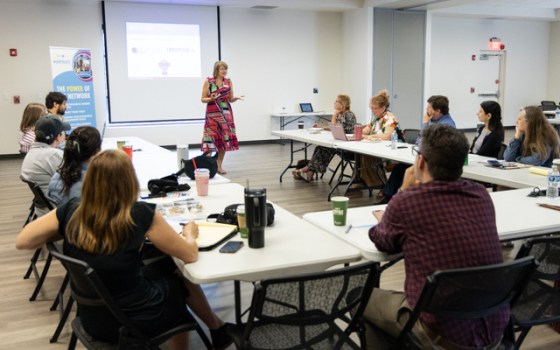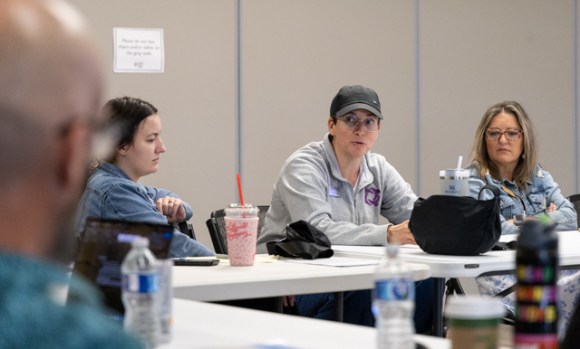Kentucky Nonprofit Network shares concerns over federal actions
Published 7:25 am Friday, May 16, 2025
DAVID MAMARIL HOROWITZ
david.horwoitz@bgdailynews.com
Centers that provide mental health care. Shelters for victims of domestic violence. Facilities where animals are adopted as pets. Programs that serve children after school during the summer. Services for the elderly and the disabled.
More than 13,000 charitable nonprofits, among over 21,000 nonprofits in total, provide these services and myriad others statewide — and, some 66% of charitable nonprofits are experiencing financial risk from pauses and cuts in local, state and federal government funding.
The Kentucky Nonprofit Network, which comprises charitable nonprofits statewide, presented that data among numerous recent updates on cuts and threats nonprofits are experiencing statewide. Just over a dozen members of nonprofits regionwide attended the presentation, held Thursday at the Bob Kirby Library.
“Never in my 30 years in this sector have I seen more attacks on the nonprofit sector that I’m seeing right now,” KNN Executive Director and CEO Danielle Clore said.
Threats, funding pauses and cuts to nonprofits have substantial ramifications in southcentral Kentucky: Approximately 800 charitable nonprofits have served 11 southcentral Kentucky counties in recent years.
Nonprofits are also indirectly impacted by federal actions such as the proposed cuts to Medicaid, said Laura Orsland, founder and executive director of the nonprofit HIVE, which serves youth and adults with intellectual and developmental disabilities as well as their families.
While nonprofits serve the general population, the vast majority served are from marginalized communities, Orsland said — for example, those who are immigrants, live with disabilities or experience poverty. So, if the federal government reduces Medicaid funding, many who participate in HIVE would lose access to service providers who transport people to and from the nonprofit, said Jessica Sheene, an advocate at the nonprofit KY SEAT who intends in time to go to HIVE to support her son, who receives Medicaid benefits through a Home and Community Based waiver.
A cut to Medicaid funding would also cause people to lose medical benefits that enable them to maintain medications and behaviors and stay safe, Sheene said.
Orsland added that the vilification of language associated with nonprofits and their missions — particularly, inclusion, equity and diversity — has also impacted the support nonprofits receive, as they rely heavily on donations and grants not solely from the government.
“We set out to serve absolutely anybody who needs our services, and the more marginalized you are, the more we want to help you,” Orsland said.
Clore urged residents to contact members of Congress frequently to advocate for such organizations, especially U.S. Rep. Brett Guthrie, R-Bowling Green, and U.S. senators Mitch McConnell and Rand Paul. Uncertainty over what could happen is high as changes are pending or occurring in numerous areas that serve the public.
The federal government has targeted numerous areas of service for cuts and pauses, including the National Endowment for the Arts, National Endowment for the Humanities, Institute of Museum and Library Services, immigration, the Environmental Protection Agency, USDA and the volunteer agency Americorps, according to KNN.
Also targeted are nonprofits that use language being labeled as diversity, equity and inclusion, as well as grant managers who have been fired from federal agencies, according to KNN.
Meanwhile, an executive order from the beginning of President Donald Trump’s second term attempted to cancel numerous federal grants before a lawsuit issued an injunction, which led to some nonprofits getting their funding back — and that has worked its way through the courts toward the Supreme Court.
Another aspect of current events, according to KNN, is an inability to talk to members of government agencies to understand what’s happening to them.
“The staffing has been cut, or they’re afraid to speak out, or they’re leaving because of what’s happening at the federal level,” Clore said. “So, we continue to hear from our members that they can’t put a person on the phone or to get email to understand what’s happening to them.”
A key lawsuit KNN is closely watching concerns the Inflation Reduction Act for the USDA and the Infrastructure and Jobs Act.
The president’s draft budget is also proposing $163 billion in budget cuts, including to FEMA, Substance Abuse and Mental Health Services Administration, the Environmental Protection Agency, Housing and Urban Development, refugees, heating assistance, community service block grants, rental assistance, and AmeriCorps, according to KNN.
KNN hopes Congress will restore the funds; it has until Oct. 1 to pass it.
Another important piece is the 2017 Tax Cuts and Jobs Act, which expires at the end of 2025. Significant tax cuts are being discussed by Congress, according to KNN — and federal funds account for 46% of the state’s revenue, according to Clore.
“It’s important to recognize that for every dollar Kentucky pays in taxes, we receive $3.35 in federal funds,” Clore said. “We are the second largest recipient in the nation ….”
Another piece of important legislation, according to KNN, is a bill that would grant presidential administrations “unprecedented authority” to revoke organizations’ nonprofit status if they’re deemed “terrorist supporting” — “without requiring the (secretary of the U.S. Department of Treasury) to share full evidence or ensure due process,” KNN stated.
“If I run an emergency shelter and someone comes to stay the night with us, they usually don’t show up and say, ‘Hi, I’m Danielle and I’m a terrorist, can I stay here?’ ” Clore said. “So, if we give them shelter, and it turns out they’re a terrorist, then what? Are we supporting? The gray area here is just incredibly significant.
“Even if there is due process, if (an organization) is accused of being a terrorist supporting organization, you’re toast: Donor trust and integrity is what we have — it’s what we rely on … Of course we’re opposed to terrorism, but (…) the definition is not there, the due process is not there and the irreparable harm to everyday nonprofits is a serious risk.”











